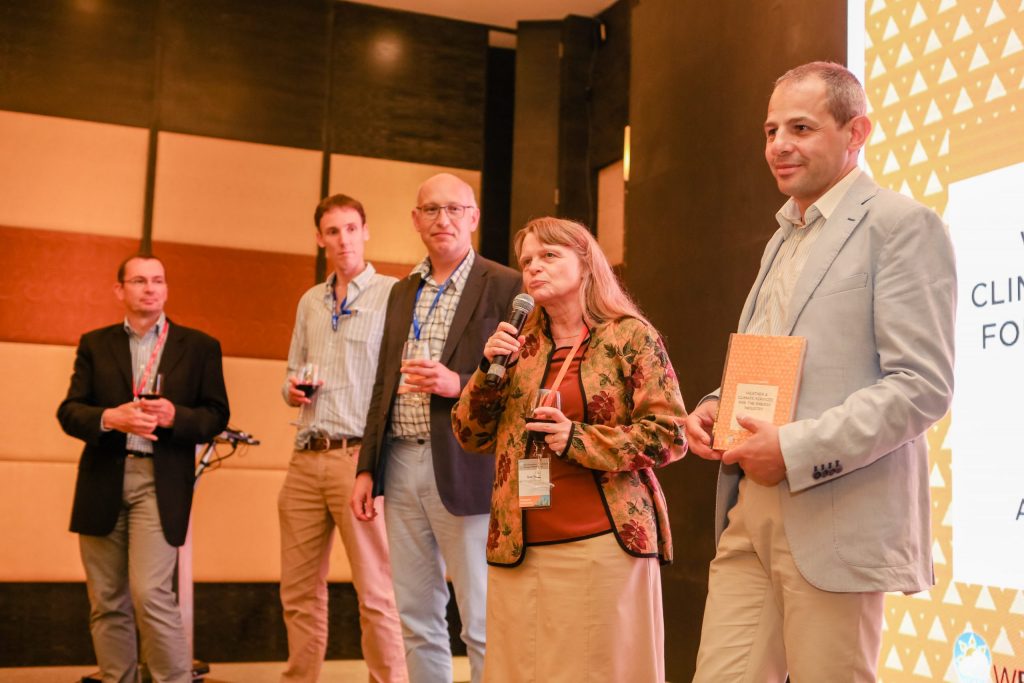NCAR DEPUTY DIRECTOR INSPIRES WITH HER COMMITMENT TO SCIENCE THAT SERVES SOCIETY AND COLLABORATIVE APPROACH TO ENERGY CHALLENGES
The second interview in our ‘getting to know WEMC directors’ series takes us to the USA. Sue Ellen Haupt, is Senior Scientist and Deputy Director of the Research Applications Laboratory (RAL) at the US National Center for Atmospheric Research (NCAR), which progresses research in all areas of atmospheric science, from building climate and weather models, to planning and operating field observational campaigns, and also WEMC Director of Research.
Sue Ellen shares her inspiring career path guided by science that serves society, reminisces on the budding beginnings of WEMC five years ago and highlights the collaborative power that can help solve the world’s energy challenges and enable a clean energy transition. She began our interview expanding on her strategic role at NCAR:
“The Research Applications Laboratory (one of seven laboratories at NCAR) focuses on ‘science that serves society.’ Thus, we look for interesting problems that directly impact stakeholders, including the general population, and apply science to find solutions. I help to set the strategy for which problems to pursue and work with our scientists to connect with the right stakeholders and understand their problem so we can collaborate on applying the best science to address those challenges. Energy is one of those important problems where we can apply our understanding of variations in weather and climate to harvest energy most efficiently and economically while meeting the broader goals of society, such as decreasing emissions of carbon and other pollutants.”
We asked how long Sue Ellen had worked in science with energy applications and what motivated her to pursue this path?
“My research career started with very basic theoretical research. Although it was academically interesting and challenging, over time, I became drawn to problems with more obvious applications where I could see a more direct benefit to accomplishing that type of research. I began with air pollution problems, which require a knowledge of the atmospheric boundary layer as well as large scale atmospheric dynamics to model atmospheric transport and dispersion. Then as renewable energy began to develop, I worked with colleagues to learn how to apply that same scientific knowledge to modeling for wind energy applications. After working with a team to develop a systems approach to forecast for wind energy, I began planning systems to forecast solar power output. Since then, my colleagues and I have used many modeling and artificial intelligence (AI) techniques to model for renewable energy from very short range out to climate scales. I find this approach to scientific research rewarding, because it enables deploying more renewable energy, moving the world closer to clean energy production.”
We looked back at what led Sue Ellen to be part of WEMC’s founding directors’ team, with her role as Director of Research, and how her involvement in WEMC supports further activities and organizational connections:
“After attending the first ICEM in 2011 in Australia, I recognized a budding organization with the potential to bring experts together from around the world to recognize and leverage the importance of meteorology within the energy industry. Shortly afterward, I initiated a major US project on forecasting for solar energy to enable grid integration. I stayed in touch with the contacts that I made at that first ICEM and shared our research outcomes while following what was happening in other parts of the world, particularly in similar projects being accomplished in Australia and Europe. Even before WEMC was first incorporated, I saw the value that can be obtained from that international connection and open sharing of information that can push the state-of-the-science forward on an international scale. By the third ICEM, which I hosted in Boulder, Colorado, these collegial scientific relationships had become cemented and Alberto Troccoli was ready to form WEMC, which was announced at that 2015 meeting in the US. I was thrilled to become part of the leadership of this nascent organization with so much potential to do good in the world. As a US representative, I enjoy the opportunity to share our developments and learn from those of other countries. As I have also been active in other professional organizations, including the American Meteorological Society and the Energy Systems Integrations Group, I also see the opportunity to help these organizations work together, leveraging the strengths of each, to continue to learn and develop new approaches to solving the world’s energy challenges, both for now and in the future.”
As we approach WEMC’s 5th anniversary, we sought out what role Sue Ellen envisaged for WEMC in the next 5-10 years:
“WEMC is in the middle of enabling the clean energy transition. Many countries are announcing goals to move toward high deployments of renewable energy, which means that we must understand and develop methods to deal with their variability. Not only do wind and solar power rely on knowledge of the ever-changing environment, but so do traditional and more modern ways of planning for energy usage. For instance, hydropower has been important for quite some time, but changes in climate are likely to make changes in the hydro resource, which must be estimated. Energy load also depends highly on weather and climate factors and individuals and companies alter their energy usage according to changes in environmental conditions (temperature, humidity, occurrence of extreme events, etc.).”
As we concluded our conversation Sue Ellen asserted that professionals with an understanding of how meteorology impacts the energy sector are going to be in high demand during this transition. She expanded on their critical role:
“Not only to solve the technical problems, but also to advise on best energy policy, educate the populace, provide accurate scientific information, and more. So, it’s a perfect time to be at the nexus of energy and meteorology and WEMC is in a great place to facilitate all of these connections.”
The value Sue Ellen places in the fostering of international connections and open sharing of information made possible through conferences and organizations, including WEMC, who she identifies as having a central position in enabling the clean energy transition, is clear.
We, at WEMC, thank her for featuring in our Director series of interviews, our last conversation was with Laurent Dubus, and her continued inspiration and support of our vision to contribute to the global activities of science and energy experts by facilitating shared learning and interaction between our stakeholders from the energy industry and the weather, climate and broader environmental sciences community.




